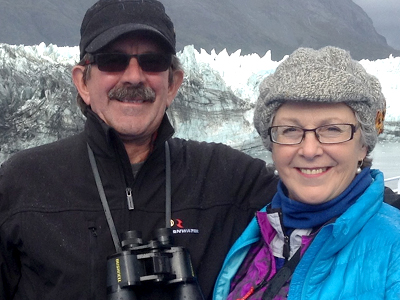
"I say yes to participating because seniors can play an important role in helping other seniors.”
– Vicky Dabbs, Richmond
Steveston resident Vicky Dabbs believes in giving back. Although she’s in great health, the 64-year-old semi-retired nurse has taken part in the trial of a new shingles vaccine. Dabbs feels compelled to do her part for research because she’s seen firsthand the impact shingles can have.
“I saw a lot of geriatric patients with shingles when I worked in hospitals. Many of them were quite weakened for a considerable length of time and in a lot of pain. Sometimes it’s very debilitating.”
Shingles is an infection caused by the same virus that causes chickenpox. It mostly affects older people. Milder cases cause pain and rashes while more severe cases include fever, muscle aches and ongoing pain for months or even years. About 30 per cent of people will get shingles in their lifetime.
There was a pre-existing shingles vaccine on the market, but it is a live vaccine—containing a small amount of the chickenpox virus—so it can’t be given to people who have any kind of immunocompromised condition.

“This new vaccine in this study show promise for immunocompromised people—who really need it most—and that’s a fantastic thing. I’m proud to be part of any research that can help them,” says Dabbs.
Dr. Jan Dutz, a research scientist with Vancouver Coastal Health Research Institute, is leading the new shingles vaccine study in Vancouver, as part of a larger multi-center trial. The new vaccine, called Shingrix has been shown to be effective. Dr. Dutz says the new vaccine shows great promise for immunocompromised people but is also significantly more effective for the regular population than the previously available vaccine.
“The previous vaccine only had moderate efficacy— about 50% efficacy in ages 60 and up dropping to only 38% efficacy in ages 70 and older," say Dr. Dutz. "This new vaccine has an efficacy rate of about 97% adults younger than 50 and 91% for those between 50-70.”
Dr. Dutz and his colleagues have already completed the first phase of the new shingles vaccine trial. Their results are published in the New England Journal of Medicine.

In the first phase of the trial, participants were either given a placebo or the new vaccine. At the end of phase one, Dabbs found out she had been given the vaccine, but was pleased to learn that if she had been given the placebo, the researchers would then have given her the opportunity to have the new vaccine too. Dr. Dutz says it was only fair to do so. “If people gave their time to help us study this vaccine it was only fair to offer those on placebo the chance to have it too. These studies are often a win-win for everyone. The clinicians get experience with vaccine, the companies get to learn more about their products and participants get the benefit of early access to protection with products that are very safe.”
“I only had to do a few blood tests over a 5-year period, get a couple of injections and answer a few calls. It was very rewarding for me to feel like I am giving back.”
Dabbs is now part of the second phase of the study—a six-year follow-up to see how long the new vaccine protection lasts and how safe it is. The placebo patients who opted to get the vaccine are also being followed. Dabbs says she’s continuing with the study because it’s been a very easy process.

Dabbs encourages other seniors to take part in research. “We have the time to take part in studies and so many of these diseases will affect our age group more. It’s in our best interest and it helps other people.” Dabbs has been a participant in other studies too, and enjoyed the experience. She’s still able to find lots of time for visiting her grand-kids and travelling with her husband. Now, she says she doesn’t have to worry as much about getting shingles.
The vaccine has been approved in Canada as of October 2017 and is currently available through clinics and pharmacies across Canada.
THIS IS ONE PATIENT’S STORY OF PARTICIPATING IN A CLINICAL TRIAL. YOUR EXPERIENCE MAY DIFFER. LEARN MORE ABOUT CLINICAL TRIALS BEFORE PARTICIPATING.


